Hey there, fellow dog lover! Are you thinking about whipping up some homemade goodness for your furry companion?
Great idea! Crafting your own dog food not only ensures your pup’s nutrition but can also be easy on your wallet and kinder to the planet.
Let’s dive into the world of tail-wagging culinary adventures with our complete guide on how to make delicious and nutritious homemade dog food.
Difference Between Vet Approved Homemade Dog Food and Store Bought Food
If the matter is for your pup`s diet, the decision between store-bought and homemade dog food is a crucial one.
Opting for vet-approved homemade dog food offers a range of benefits that can make a significant difference in your pup’s overall health and well-being.
Let’s delve into the details and explore the key differences and benefits of vet-approved homemade dog food compared to store-bought alternatives.
1. Control over Ingredients
Homemade: Creating your dog’s meals at home allows you complete control over the ingredients used. You can handpick high-quality, fresh ingredients that align with your pup’s specific dietary needs and any health conditions.
Store-Bought: Commercial dog foods often include a variety of additives, fillers, and preservatives to prolong shelf life. These might not always be the best for your dog’s health, especially if they have allergies or sensitivities.
2. Nutritional Customization
Homemade: Vet-approved homemade recipes can be tailored to your dog’s exact nutritional requirements. For instance, if your pup has kidney disease or allergies, you can adjust recipes to suit their needs.
Store-Bought: Commercial dog foods aim to cater to a wide range of dogs. However, your dog’s unique requirements might not be fully met by these generalized options.
3. Freshness and Quality
Homemade: Cooking meals at home ensures the use of fresh ingredients that retain their nutritional value. You’re in charge of the sourcing and can make informed choices about the quality of ingredients.
Store-Bought: The processing and storage of commercial dog foods can sometimes compromise the nutritional integrity of the ingredients.
4. Control over Additives
Homemade: You have the power to eliminate additives, artificial colors, and flavors, which might be present in some commercial dog foods.
Store-Bought: Many store-bought options include artificial additives that might not align with your dog’s natural dietary needs.
5. Potential Allergen Avoidance
Homemade: Crafting meals at home gives you the ability to avoid specific ingredients that your dog might be allergic to or intolerant of.
Store-Bought: Commercial foods might contain common allergens that could trigger adverse reactions in sensitive dogs.
Benefits of Vet Approved Homemade Dog Food

Tailored Nutrition
Homemade recipes that are vet-approved can be customized to your dog’s age, size, activity level, and health conditions. This tailored approach supports your pup’s individual needs and can address specific health concerns.
Transparency
When you cook at home, you know exactly what’s going into your dog’s bowl. This transparency ensures that your pup is getting wholesome ingredients without any hidden surprises.
Freshness
Homemade meals are prepared using fresh ingredients, retaining their nutrients and flavors. This can contribute to improved digestion and overall vitality.
Quality Control
As a pet parent, you have control over the quality of ingredients. You can choose high-quality protein sources, whole grains, and fresh produce.
Reduced Additives
Homemade meals allow you to reduce or eliminate artificial additives, preservatives, and fillers that might be present in store-bought options.
Bonding Time
Preparing meals for your dog can be a bonding experience. It’s an opportunity to show your love and care through nourishing, homemade treats.
Potential Health Improvements
For dogs with allergies, sensitivities, or health conditions, vet-approved homemade diets can lead to improved health outcomes and enhanced quality of life.
7 Steps For Healthy Homemade Dog Food

Cooking homemade meals for your pup is a fantastic way to show your love and ensure they’re getting the best.
Let’s discuss 7 essential steps. These tips and steps are your recipe for success in making delicious and nutritious meals for your furry friend.
Step 1: Consult Your Vet – They’re Like Doggy Nutritionists!
Before you put on your chef’s hat, give your vet a friendly ring. They’re like your pup’s personal nutrition expert.
By considering factors like your dog’s age, breed, activity level, and health status, your vet can tailor-make nutritional advice for your four-legged friend.
Step 2: Picking the Right Ingredients – Let’s Create a Pup-Worthy Grocery List!
Now, let’s get shopping! For a balanced and happy pup, ensure your ingredients checklist includes these essentials:
- Protein: Think chicken, beef, lamb, fish, and eggs. These help keep those doggy muscles strong and sturdy.
- Fat: Get those energy levels up with sources like olive oil, fish oil, and avocado oil. They also help vitamins work their magic.
- Carbohydrates: Brown rice, sweet potatoes, and oats are your canine’s carb buddies. They offer energy and fiber to keep things moving.
- Vitamins and Minerals: Veggies and fruits are the colorful superheroes here. They’re jam-packed with vitamins and minerals for a healthy pup.
Remember to avoid sneaky toxic foods like chocolate, grapes, and onions!
Step 3: Crafting a Deliciously Balanced Recipe – Paws and Plates Ready!
Time to get creative in the kitchen! Your pup deserves a gourmet meal, too.
Explore the wide range of vet-approved recipes available online, in cookbooks, or even through your dog-parent network.
Choose recipes that come with positive reviews – the pup community knows what’s tasty!
Step 4: Let’s Get Cookin’ – Prepare a Feast Fit for Your Furry Royalty!
Time to don your apron and grab your utensils. Depending on the ingredients, you might need to channel your inner chef.
Meats like chicken and beef might need a good browning, while veggies could use some gentle softening.
And don’t forget – cook things thoroughly to make sure no pesky bacteria survive!
Step 5: Storing the Culinary Masterpiece – Keep It Fresh and Yummy!
What’s cooking without a little bit of storage magic? Once your delicious homemade dog food is ready, store it right.
Pop it in the fridge for up to 3 days or freeze it for a max of 3 months. To make serving a breeze, divide it into meal-sized portions.
Step 6: Chow Time! – Let’s See Those Tails Wagging!
The moment of truth! Your pup’s taste buds are in for a treat.
Start with small portions and gradually increase as your fur baby gets accustomed to the new flavors.
Hydration is the key, so make sure your pup has a water bowl nearby.
Step 7: Keep an Eye on Health – Happy and Healthy Pups Rule!
With great meals come great responsibilities! Keep an eye on your pup’s weight and overall health.
If you notice any changes, it’s time for a small recipe tweak. And don’t forget those regular vet checkups – they’re like doggy wellness appointments!
Vet Approved Homemade Dog Food Recipes: Let’s Cook Up a Storm!
Cooking for your furry friend is a fantastic way to ensure they’re getting the best nutrition while enjoying a variety of flavors.
Here are some delicious and nutritious recipes that will make your pup’s tail wag with delight!
1. Chicken and Rice Recipe: Simple Goodness for a Healthy Pup
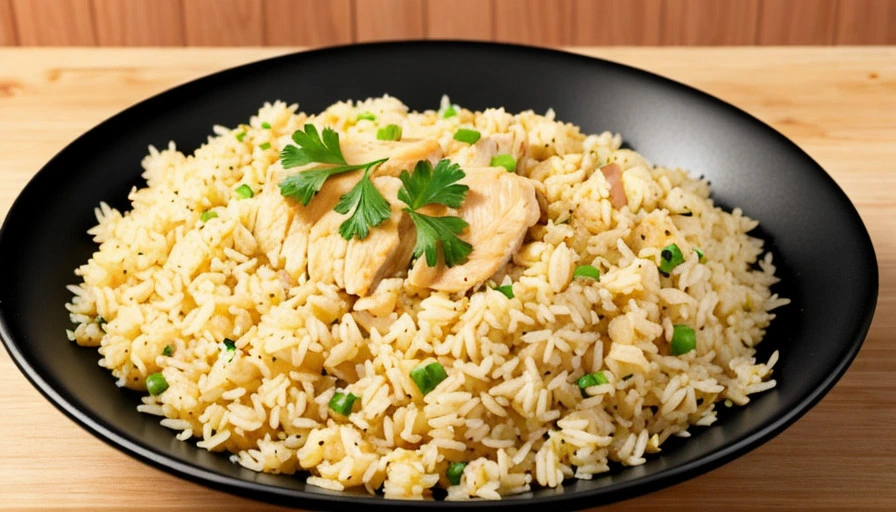
Ingredients:
- 1 pound boneless, skinless chicken breast, cooked and shredded
- 1 cup cooked brown rice
- 1/2 cup chopped vegetables (carrots, peas, green beans)
- 1 tablespoon vegetable oil
- 1 teaspoon chicken or fish oil
Instructions:
- Combine the cooked chicken, brown rice, chopped vegetables, vegetable oil, and fish oil in a large bowl.
- Mix all the ingredients well to ensure an even distribution of flavors.
- Serve the mixture immediately or store it in the refrigerator for later meals.
Importance and Benefits: Chicken provides essential protein for muscle health, while brown rice offers carbohydrates for energy. The chopped vegetables are packed with vitamins and minerals that contribute to overall health. The oils enhance taste and provide necessary fats for energy and nutrient absorption.
2. Beef and Sweet Potato Recipe: A Tasty Blend of Goodness

Ingredients:
- 1 pound ground beef, cooked
- 1 cup cooked sweet potato
- 1/2 cup chopped vegetables (carrots, peas, green beans)
- 1 tablespoon vegetable oil
- 1 teaspoon beef or fish oil
Instructions:
- Mix the cooked ground beef, sweet potato, chopped vegetables, vegetable oil, and fish oil in a bowl.
- Thoroughly combine the ingredients for a balanced blend.
- Serve immediately or store it in the fridge for later meals.
Importance and Benefits: Beef supplies protein and iron, while sweet potato provides vitamins A and C. The combination offers a well-rounded nutritional profile that supports your pup’s overall well-being.
3. Turkey and Lentils Recipe: A Protein-Packed Powerhouse
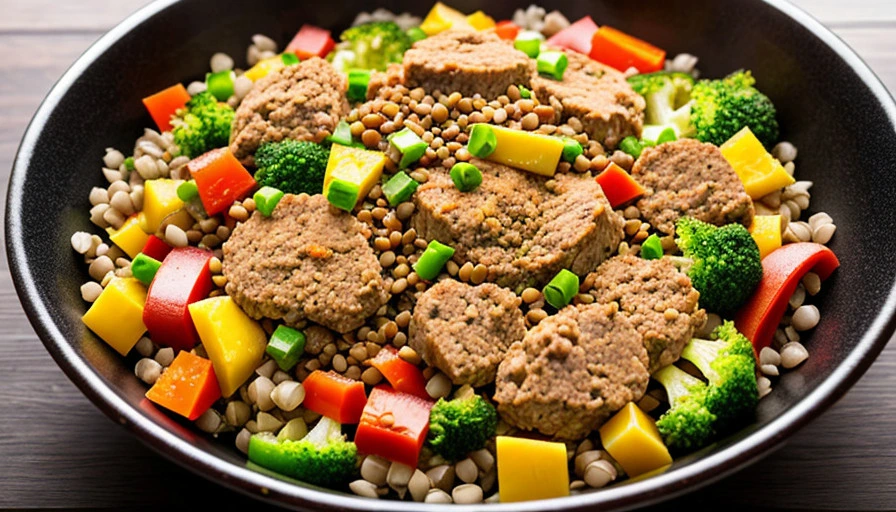
Ingredients:
- 1 pound ground turkey, cooked
- 1 cup cooked lentils
- 1/2 cup chopped vegetables (carrots, peas, green beans)
- 1 tablespoon vegetable oil
- 1 teaspoon turkey or fish oil
Instructions:
- Mix the cooked ground turkey, lentils, chopped vegetables, vegetable oil, and fish oil in a bowl.
- Make sure all the ingredients are evenly distributed.
- Serve the mixture right away or store it in the refrigerator for later.
Importance and Benefits: Turkey provides lean protein, while lentils contribute fiber and essential minerals. This recipe supports muscle health and digestive well-being.
4. Fish and Potato Recipe: Omega-3 Rich Delight

Ingredients:
- 1 pound cooked fish (salmon, tuna, cod)
- 1 cup cooked potato
- 1/2 cup chopped vegetables (carrots, peas, green beans)
- 1 tablespoon vegetable oil
- 1 teaspoon fish oil
Instructions:
- Combine the cooked fish, potato, chopped vegetables, vegetable oil, and fish oil.
- Mix everything thoroughly for a well-balanced meal.
- Serve immediately or store it in the fridge for future feedings.
Importance and Benefits: Fish offers omega-3 fatty acids, supporting your pup’s skin, coat, and heart health. Potatoes add carbohydrates for energy and fiber for digestion.
5. Lamb and Quinoa Recipe: A Taste of Unique Protein
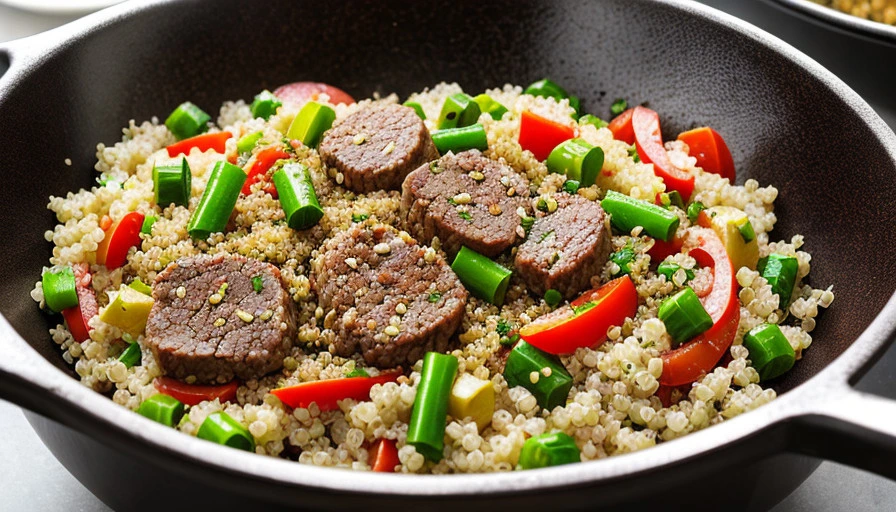
Ingredients:
- 1 pound ground lamb, cooked
- 1 cup cooked quinoa
- 1/2 cup chopped vegetables (carrots, peas, green beans)
- 1 tablespoon vegetable oil
- 1 teaspoon lamb or fish oil
Instructions:
- Mix the cooked ground lamb, quinoa, chopped vegetables, vegetable oil, and fish oil.
- Ensure all ingredients are well combined.
- Serve the mixture promptly or store it in the refrigerator for later meals.
Importance and Benefits: Lamb offers a different protein source, while quinoa is rich in protein and fiber. This recipe adds diversity to your pup’s diet and supports digestion.
6. Pork and Applesauce Recipe: A Sweet and Savory Delight
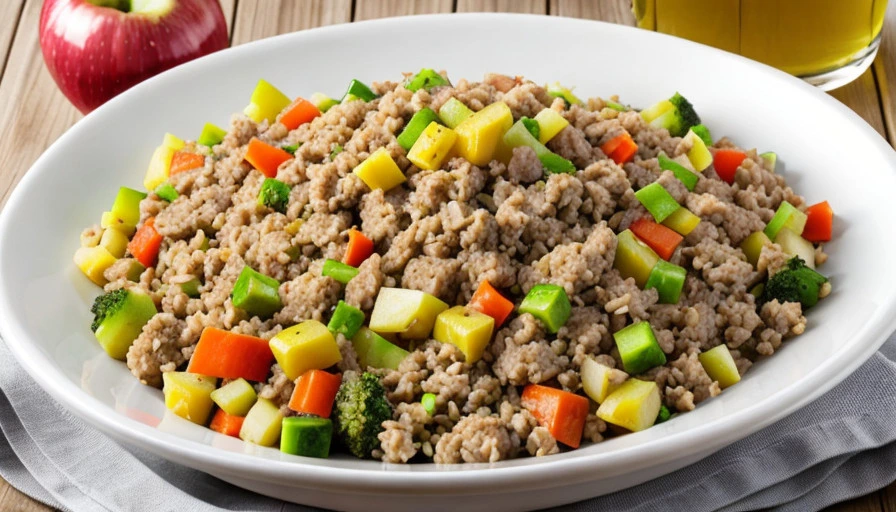
Ingredients:
- 1 pound ground pork, cooked
- 1 cup applesauce
- 1/2 cup chopped vegetables (carrots, peas, green beans)
- 1 tablespoon vegetable oil
- 1 teaspoon pork or fish oil
Instructions:
- Combine the cooked ground pork, applesauce, chopped vegetables, vegetable oil, and fish oil.
- Mix all the ingredients thoroughly.
- Serve immediately or store it in the fridge for later consumption.
Importance and Benefits: Pork provides protein, while applesauce adds natural sweetness and vitamins A and C. This recipe introduces a touch of flavor variety to your pup’s meals.
7. Beef and Barley Recipe: Wholesome Comfort in a Bowl
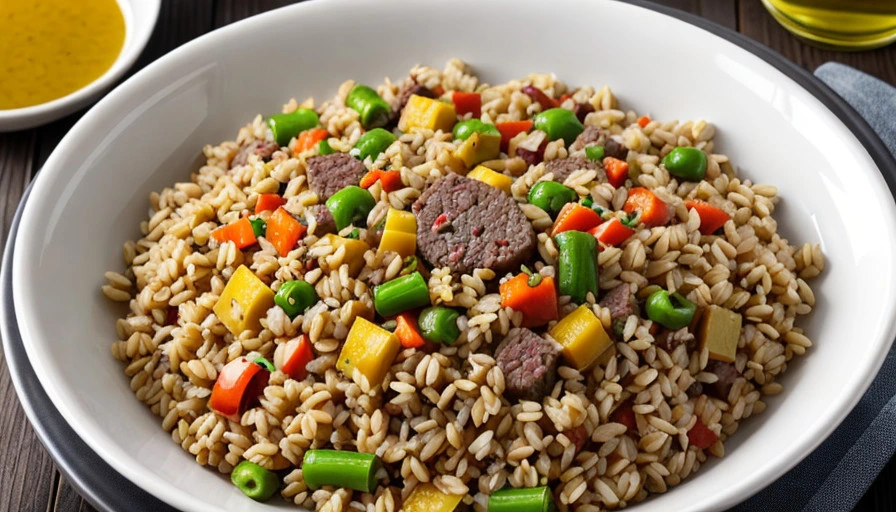
Ingredients:
- 1 pound ground beef, cooked
- 1 cup cooked barley
- 1/2 cup chopped vegetables (carrots, peas, green beans)
- 1 tablespoon vegetable oil
- 1 teaspoon beef or fish oil
Instructions:
- Mix the cooked ground beef, barley, chopped vegetables, vegetable oil, and fish oil.
- Thoroughly combine the ingredients for a balanced mixture.
- Serve right away or refrigerate for later use.
Importance and Benefits: Beef provides protein and iron, while barley is a hearty source of carbohydrates and fiber. This recipe brings a sense of comfort and nutrition to your pup’s bowl.
8. Beef and Pumpkin Stew Recipe: Fall Flavors All Year Round
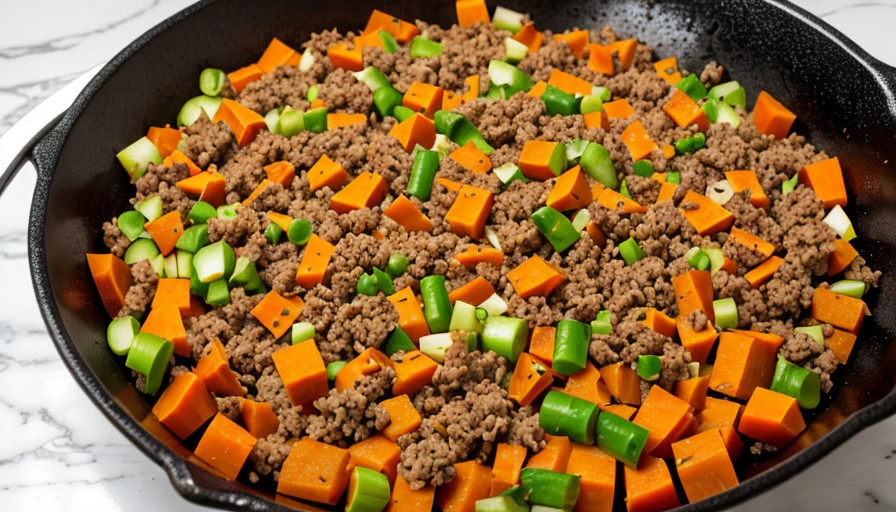
Ingredients:
- 1 pound ground beef, cooked
- 1 cup cooked pumpkin
- 1/2 cup chopped vegetables (carrots, peas, green beans)
- 1 tablespoon vegetable oil
- 1 teaspoon beef or fish oil
Instructions:
- Combine the cooked ground beef, pumpkin, chopped vegetables, vegetable oil, and fish oil.
- Mix the ingredients well for a hearty stew.
- Serve immediately or store it in the refrigerator for later consumption.
Importance and Benefits: Beef brings in protein and iron, while pumpkin offers vitamins A and C. This recipe combines flavors reminiscent of autumn and supports overall health.
Watch this video for homemade dog food recipes
Now let’s learn recipes for dogs with different health conditions.
Vet Approved Homemade Dog Food Recipes For Kidney Disease

Here are some vet-approved homemade dog food recipes specifically tailored for dogs with kidney disease:
1. Low-Phosphorus Chicken and Rice Recipe
Ingredients:
- 1 cup cooked chicken breast, shredded
- 1/2 cup cooked white rice
- 1/4 cup cooked carrots, finely chopped
- 1 tablespoon olive oil
- 1/4 teaspoon calcium carbonate supplement (consult your vet)
Instructions:
- Mix the shredded chicken, cooked rice, chopped carrots, and olive oil in a bowl.
- Add the recommended amount of calcium carbonate supplement and mix well.
- Serve in small portions as advised by your vet.
2. Turkey and Sweet Potato Mash
Ingredients:
- 1/2 cup cooked ground turkey
- 1/2 cup cooked sweet potato, mashed
- 1/4 cup cooked green beans, finely chopped
- 1 teaspoon flaxseed oil (consult your vet)
Instructions:
- Combine the ground turkey, mashed sweet potato, and chopped green beans.
- Add the recommended amount of flaxseed oil and mix well.
- Serve according to your vet’s guidance.
3. Rice and Egg White Delight
Ingredients:
- 1/2 cup cooked white rice
- 2 egg whites, cooked and finely chopped
- 1/4 cup cooked zucchini, finely chopped
- 1/4 teaspoon fish oil (consult your vet)
Instructions:
- Mix the cooked white rice, chopped egg whites, and chopped zucchini.
- Add the recommended amount of fish oil and mix well.
- Serve in small portions as per your vet’s instructions.
4. Low-Protein Lamb and Squash Stew
Ingredients:
- 1/2 cup cooked ground lamb
- 1/2 cup cooked butternut squash, mashed
- 1/4 cup cooked peas, finely chopped
- 1 teaspoon coconut oil (consult your vet)
Instructions:
- Combine the ground lamb, mashed butternut squash, and chopped peas.
- Add the recommended amount of coconut oil and mix well.
- Serve as directed by your vet.
5. Low-Phosphorus Fish and Potato Recipe
Ingredients:
- 1/2 cup cooked fish (low-phosphorus fish like cod or sole)
- 1/2 cup cooked potato, mashed
- 1/4 cup cooked carrots, finely chopped
- 1 teaspoon fish oil (consult your vet)
Instructions:
- Mix the cooked fish, mashed potato, and chopped carrots.
- Add the recommended amount of fish oil and mix well.
- Serve in small portions based on your vet’s advice.
Remember, these recipes are designed to support dogs with kidney disease, but individual needs may vary.
Always consult your veterinarian before making changes to your dog’s diet, and follow their recommendations closely to ensure your pup’s health and well-being.
Homemade Diabetic Dog Food
Certainly, here are some homemade dog food recipes that are suitable for diabetic dogs. These recipes are designed to help regulate blood sugar levels and provide balanced nutrition.
However, it’s crucial to consult your veterinarian before making any changes to your dog’s diet, especially if they have diabetes.
1. Turkey and Green Bean Delight
Ingredients:
- 1 cup cooked ground turkey (lean)
- 1 cup cooked green beans, chopped
- 1/2 cup cooked quinoa or brown rice
- 1 teaspoon fish oil (consult your vet)
- 1/4 teaspoon cinnamon (optional, consult your vet)
Instructions:
- Combine the cooked ground turkey, chopped green beans, and cooked quinoa or brown rice.
- Mix in the fish oil and cinnamon (if using), making sure the ingredients are well combined.
- Serve in appropriate portions based on your vet’s guidance.
2. Chicken and Sweet Potato Stew
Ingredients:
- 1 cup cooked chicken breast, shredded
- 1 cup cooked sweet potato, mashed
- 1/2 cup cooked carrots, chopped
- 1 teaspoon coconut oil (consult your vet)
- 1/4 teaspoon turmeric (optional, consult your vet)
Instructions:
- Mix the shredded chicken, mashed sweet potato, and chopped carrots together.
- Incorporate the coconut oil and turmeric (if using), ensuring everything is well mixed.
- Serve in appropriate portions as advised by your vet.
3. Beef and Pumpkin Mash
Ingredients:
- 1 cup cooked lean ground beef
- 1/2 cup cooked pumpkin, mashed
- 1/4 cup cooked broccoli, finely chopped
- 1 teaspoon flaxseed oil (consult your vet)
Instructions:
- Combine the cooked ground beef, mashed pumpkin, and finely chopped broccoli.
- Add the flaxseed oil and mix thoroughly.
- Serve according to your vet’s recommendations.
4. Fish and Spinach Medley
Ingredients:
- 1 cup cooked fish (low-fat options like cod or sole)
- 1 cup cooked spinach, chopped
- 1/2 cup cooked quinoa or brown rice
- 1 teaspoon olive oil (consult your vet)
Instructions:
- Mix the cooked fish, chopped spinach, and cooked quinoa or brown rice.
- Drizzle in the olive oil and mix well.
- Serve in appropriate portions based on your vet’s advice.
Remember to monitor your diabetic dog closely, as their dietary needs may vary.
These recipes aim to provide a balance of lean protein, complex carbohydrates, and healthy fats to help regulate blood sugar levels.
Regular check-ins with your veterinarian are essential to ensure your dog’s health and well-being.
Homemade Food For Dogs With Yeast Infections
Homemade dog food for dogs with yeast infections should focus on eliminating ingredients that promote yeast growth while providing nourishment.
Keep in mind that while homemade diets can support your dog’s health, it’s crucial to work closely with your veterinarian to address yeast infections effectively. Here are some recipes to consider:
1. Lean Turkey and Broccoli Mix
Ingredients:
- 1 cup cooked ground turkey (lean)
- 1/2 cup cooked broccoli, finely chopped
- 1/4 cup cooked quinoa or brown rice
- 1 teaspoon coconut oil (consult your vet)
- 1/4 teaspoon oregano (anti-fungal, consult your vet)
Instructions:
- Combine the cooked ground turkey, finely chopped broccoli, and cooked quinoa or brown rice.
- Mix in the coconut oil and oregano (if using).
- Serve in appropriate portions based on your vet’s guidance.
2. Chicken and Zucchini Stew
Ingredients:
- 1 cup cooked chicken breast, shredded
- 1/2 cup cooked zucchini, finely chopped
- 1/4 cup cooked sweet potato, mashed
- 1 teaspoon olive oil (consult your vet)
- 1/4 teaspoon turmeric (anti-inflammatory, consult your vet)
Instructions:
- Mix the shredded chicken, finely chopped zucchini, and mashed sweet potato.
- Incorporate the olive oil and turmeric (if using), ensuring thorough mixing.
- Serve in proper portions as advised by your vet.
3. Fish and Cauliflower Delight
Ingredients:
- 1 cup cooked fish (low-fat options like cod or sole)
- 1 cup cooked cauliflower, mashed
- 1/2 cup cooked green beans, chopped
- 1 teaspoon flaxseed oil (consult your vet)
- 1/4 teaspoon parsley (anti-fungal, consult your vet)
Instructions:
- Combine the cooked fish, mashed cauliflower, and chopped green beans.
- Add the flaxseed oil and parsley (if using), and mix well.
- Serve in appropriate portions based on your vet’s advice.
4. Turkey and Carrot Bowl
Ingredients:
- 1 cup cooked ground turkey (lean)
- 1/2 cup cooked carrots, finely chopped
- 1/4 cup cooked white rice
- 1 teaspoon apple cider vinegar (anti-fungal, consult your vet)
- 1/4 teaspoon garlic powder (anti-fungal, consult your vet)
Instructions:
- Mix the cooked ground turkey, finely chopped carrots, and cooked white rice.
- Incorporate the apple cider vinegar and garlic powder (if using), ensuring even mixing.
- Serve in proper portions according to your vet’s guidance.
Remember, these recipes are intended to support dogs with yeast infections, but individual needs may vary.
Working with your veterinarian is essential to address the underlying cause of the yeast infection and develop an appropriate treatment plan, which may include dietary changes.
Homemade Dog Food For Liver Disease
Homemade dog food for dogs with liver disease should focus on reducing the workload on the liver and providing easily digestible nutrients.
However, it’s essential to collaborate closely with your veterinarian to create a suitable diet plan. Here are some recipes to consider:
1. Low-Protein Chicken and Rice Stew
Ingredients:
- 1 cup cooked chicken breast, shredded (low in fat)
- 1/2 cup cooked white rice
- 1/4 cup cooked carrots, finely chopped
- 1 teaspoon olive oil (consult your vet)
- 1/4 teaspoon dandelion greens (liver support, consult your vet)
Instructions:
- Mix the shredded chicken, cooked white rice, and finely chopped carrots.
- Incorporate the olive oil and dandelion greens (if using).
- Serve in appropriate portions based on your vet’s guidance.
2. Turkey and Pumpkin Mash
Ingredients:
- 1 cup cooked ground turkey (lean)
- 1/2 cup cooked pumpkin, mashed
- 1/4 cup cooked green beans, finely chopped
- 1 teaspoon coconut oil (consult your vet)
- 1/4 teaspoon milk thistle (liver support, consult your vet)
Instructions:
- Combine the cooked ground turkey, mashed pumpkin, and finely chopped green beans.
- Add the coconut oil and milk thistle (if using), ensuring thorough mixing.
- Serve in proper portions as advised by your vet.
3. Fish and Sweet Potato Medley
Ingredients:
- 1 cup cooked fish (low-fat options like cod or sole)
- 1/2 cup cooked sweet potato, mashed
- 1/4 cup cooked spinach, chopped
- 1 teaspoon flaxseed oil (consult your vet)
- 1/4 teaspoon turmeric (anti-inflammatory, consult your vet)
Instructions:
- Mix the cooked fish, mashed sweet potato, and chopped spinach.
- Incorporate the flaxseed oil and turmeric (if using), and mix well.
- Serve in appropriate portions based on your vet’s advice.
4. Low-Protein Beef and Carrot Blend
Ingredients:
- 1 cup cooked lean ground beef
- 1/2 cup cooked carrots, finely chopped
- 1/4 cup cooked brown rice
- 1 teaspoon olive oil (consult your vet)
- 1/4 teaspoon ginger (anti-inflammatory, consult your vet)
Instructions:
- Combine the cooked lean ground beef, finely chopped carrots, and cooked brown rice.
- Mix in the olive oil and ginger (if using).
- Serve in proper portions according to your vet’s recommendations.
It’s important to remember that liver disease in dogs can vary in severity, so working closely with your veterinarian is crucial.
These recipes aim to support dogs with liver disease by providing easily digestible, low-protein options while considering potential liver-supporting ingredients.
Your vet will guide you on the right dietary plan based on your dog’s specific condition.
Homemade Dog Food For Pancreatitis
Homemade dog food for dogs with pancreatitis should focus on providing easily digestible and low-fat options to reduce the workload on the pancreas.
However, it’s vital to work closely with your veterinarian to create an appropriate diet plan. Here are some recipes to consider:
1. Chicken and Rice Delight
Ingredients:
- 1 cup cooked chicken breast, shredded (skinless)
- 1/2 cup cooked white rice
- 1/4 cup cooked carrots, finely chopped
- 1 teaspoon pumpkin puree (low-fat)
- 1/4 teaspoon slippery elm bark (consult your vet)
Instructions:
- Mix the shredded chicken, cooked white rice, and finely chopped carrots.
- Incorporate the pumpkin puree and slippery elm bark (if using).
- Serve in proper portions based on your vet’s guidance.
2. Turkey and Sweet Potato Mash
Ingredients:
- 1 cup cooked ground turkey (lean)
- 1/2 cup cooked sweet potato, mashed
- 1/4 cup cooked zucchini, finely chopped
- 1 teaspoon cottage cheese (low-fat)
- 1/4 teaspoon chamomile (anti-inflammatory, consult your vet)
Instructions:
- Combine the cooked ground turkey, mashed sweet potato, and finely chopped zucchini.
- Add the cottage cheese and chamomile (if using), and mix well.
- Serve in appropriate portions as advised by your vet.
3. Low-Fat Fish and Rice Mix
Ingredients:
- 1 cup cooked fish (low-fat options like cod or sole)
- 1/2 cup cooked white rice
- 1/4 cup cooked green beans, chopped
- 1 teaspoon plain yogurt (low-fat)
- 1/4 teaspoon ginger (anti-inflammatory, consult your vet)
Instructions:
- Mix the cooked fish, cooked white rice, and chopped green beans.
- Incorporate the plain yogurt and ginger (if using), and mix thoroughly.
- Serve in appropriate portions based on your vet’s advice.
4. Lean Beef and Carrot Bowl
Ingredients:
- 1 cup cooked lean ground beef
- 1/2 cup cooked carrots, finely chopped
- 1/4 cup cooked pumpkin puree (low-fat)
- 1 teaspoon white rice (cooked)
- 1/4 teaspoon marshmallow root (consult your vet)
Instructions:
- Combine the cooked lean ground beef, finely chopped carrots, and pumpkin puree.
- Mix in the cooked white rice and marshmallow root (if using).
- Serve in proper portions according to your vet’s recommendations.
Remember that pancreatitis can vary in severity, so it’s essential to collaborate closely with your veterinarian.
These recipes aim to support dogs with pancreatitis by providing low-fat, easily digestible options while considering potential anti-inflammatory and soothing ingredients.
Your vet will guide you on the right dietary plan based on your dog’s specific condition.
Homemade Dog Food For Bladder Stones
Homemade dog food for dogs with bladder stones should aim to reduce certain minerals that contribute to stone formation while providing balanced nutrition.
However, it’s crucial to consult your veterinarian before making any dietary changes, as bladder stone management requires a specialized approach. Here are some recipes to consider:
1. Low-Purine Chicken and Rice Recipe
Ingredients:
- 1 cup cooked chicken breast, shredded (skinless)
- 1/2 cup cooked white rice
- 1/4 cup cooked green beans, finely chopped
- 1 teaspoon olive oil (consult your vet)
- 1/4 teaspoon cranberry powder (consult your vet)
Instructions:
- Mix the shredded chicken, cooked white rice, and finely chopped green beans.
- Incorporate the olive oil and cranberry powder (if using), and mix well.
- Serve in proper portions based on your vet’s guidance.
2. Turkey and Pumpkin Mash
Ingredients:
- 1 cup cooked ground turkey (lean)
- 1/2 cup cooked pumpkin, mashed
- 1/4 cup cooked carrots, finely chopped
- 1 teaspoon coconut oil (consult your vet)
- 1/4 teaspoon parsley (consult your vet)
Instructions:
- Combine the cooked ground turkey, mashed pumpkin, and finely chopped carrots.
- Add the coconut oil and parsley (if using), and mix thoroughly.
- Serve in appropriate portions as advised by your vet.
3. Low-Oxalate Fish and Rice Mix
Ingredients:
- 1 cup cooked fish (low-oxalate options like cod or sole)
- 1/2 cup cooked white rice
- 1/4 cup cooked sweet potato, mashed
- 1 teaspoon flaxseed oil (consult your vet)
- 1/4 teaspoon blueberry powder (consult your vet)
Instructions:
- Mix the cooked fish, cooked white rice, and mashed sweet potato.
- Incorporate the flaxseed oil and blueberry powder (if using), and mix well.
- Serve in appropriate portions based on your vet’s advice.
4. Lean Beef and Carrot Bowl
Ingredients:
- 1 cup cooked lean ground beef
- 1/2 cup cooked carrots, finely chopped
- 1/4 cup cooked green peas, finely chopped
- 1 teaspoon pumpkin puree (low in oxalates)
- 1/4 teaspoon nettle leaf (consult your vet)
Instructions:
- Combine the cooked lean ground beef, finely chopped carrots, and green peas.
- Mix in the pumpkin puree and nettle leaf (if using).
- Serve in proper portions according to your vet’s recommendations.
It’s essential to work closely with your veterinarian to manage bladder stones effectively.
These recipes aim to support dogs with bladder stones by providing options that are low in minerals that contribute to stone formation while considering potential supportive ingredients.
Your vet will guide you on the right dietary plan based on your dog’s specific condition.
Homemade Dog Food For Pregnant Dogs
Homemade dog food for pregnant dogs requires careful attention to ensure that both the mother and her growing puppies receive proper nutrition.
Pregnant dogs have increased nutritional needs during this crucial time. It’s important to work closely with your veterinarian to develop a balanced and appropriate diet plan. Here are some recipes to consider:
1. Chicken and Sweet Potato Feast
Ingredients:
- 1 cup cooked chicken breast, shredded
- 1/2 cup cooked sweet potato, mashed
- 1/4 cup cooked carrots, finely chopped
- 1/4 cup cooked spinach, chopped
- 1 teaspoon fish oil (DHA for puppies’ brain development)
- 1/4 teaspoon prenatal dog supplement (consult your vet)
Instructions:
- Mix the shredded chicken, mashed sweet potato, chopped carrots, and chopped spinach.
- Add the fish oil and prenatal supplement, ensuring thorough mixing.
- Serve in proper portions based on your vet’s guidance.
2. Turkey and Quinoa Delight
Ingredients:
- 1 cup cooked ground turkey
- 1/2 cup cooked quinoa
- 1/4 cup cooked peas, finely chopped
- 1/4 cup cooked pumpkin puree
- 1 teaspoon flaxseed oil (consult your vet)
- 1/4 teaspoon prenatal dog supplement (consult your vet)
Instructions:
- Combine the cooked ground turkey, cooked quinoa, chopped peas, and pumpkin puree.
- Mix in the flaxseed oil and prenatal supplement, ensuring even distribution.
- Serve in appropriate portions as advised by your vet.
3. Beef and Rice Medley
Ingredients:
- 1 cup cooked lean ground beef
- 1/2 cup cooked white rice
- 1/4 cup cooked green beans, finely chopped
- 1/4 cup cottage cheese (low-fat)
- 1 teaspoon coconut oil (consult your vet)
- 1/4 teaspoon prenatal dog supplement (consult your vet)
Instructions:
- Mix the cooked lean ground beef, cooked white rice, chopped green beans, and cottage cheese.
- Add the coconut oil and prenatal supplement, and mix thoroughly.
- Serve in proper portions according to your vet’s recommendations.
4. Fish and Brown Rice Blend
Ingredients:
- 1 cup cooked fish (low-mercury options like cod or salmon)
- 1/2 cup cooked brown rice
- 1/4 cup cooked carrots, finely chopped
- 1/4 cup cooked broccoli, finely chopped
- 1 teaspoon salmon oil (DHA for puppies’ brain development)
- 1/4 teaspoon prenatal dog supplement (consult your vet)
Instructions:
- Mix the cooked fish, cooked brown rice, chopped carrots, and chopped broccoli.
- Add the salmon oil and prenatal supplement, ensuring thorough mixing.
- Serve in appropriate portions based on your vet’s advice.
Remember that the nutritional needs of pregnant dogs can vary, so it’s essential to collaborate closely with your veterinarian.
These recipes aim to provide balanced nutrition to support both the mother and her developing puppies.
Your vet will guide you on the right dietary plan based on your dog’s specific condition and stage of pregnancy.
Conclusion: Putting Your Pup’s Well-Being First
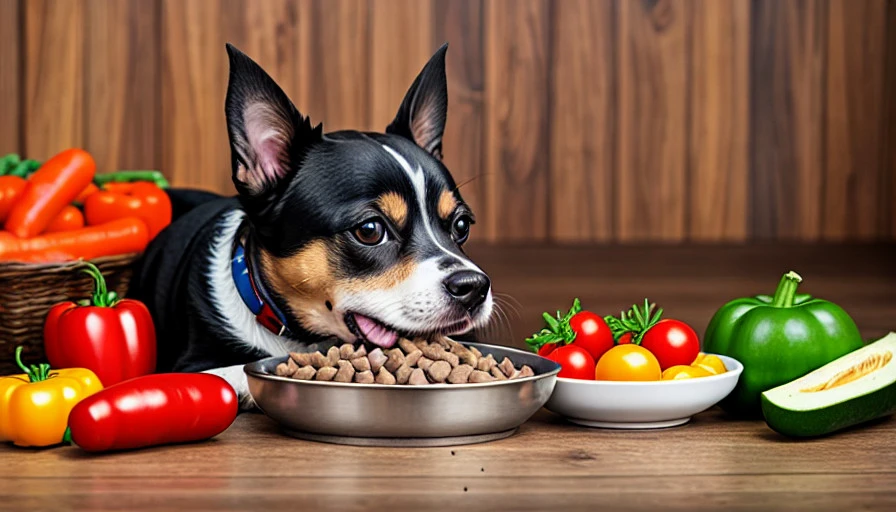
Vet-approved homemade dog food puts your pup’s well-being at the forefront.
With the ability to customize ingredients, control additives, and ensure freshness, you’re providing your furry friend with meals that cater to their unique needs.
Remember that while homemade meals have many advantages, consulting your veterinarian is essential.
They can guide you in creating balanced and nutritious recipes that support your dog’s health journey.
The choice to provide vet-approved homemade dog food is a step toward a happier, healthier, and more vibrant life for your beloved companion.
You can explore further information on RSPCA or ASPCA related to your pet.
Explore more:
- Master dog training with these basic commands
- Dog foods and nutrition to keep your doggy healthy
- Common dog health issues and care
- Master the art of dog grooming with these hacks
- What are the different types of dog breeds
FAQs
Q1: Is homemade dog food better than commercial dog food?
Homemade dog food can be a healthy option, as it allows you to control ingredients, but it should be carefully balanced to meet your dog's nutritional needs. Consult your vet for guidance.
Q2: What ingredients should I avoid when making homemade dog food?
Avoid toxic foods like chocolate, grapes, onions, and foods high in salt. Also, be cautious with seasoning, as some spices can be harmful to dogs.
Q3: How do I transition my dog to homemade food from commercial food?
Gradually mix small amounts of homemade food with your dog's regular food, increasing the proportion of homemade food over a week or two to prevent digestive upset.
Q4: Can I use raw meat in homemade dog food?
Raw meat can carry bacteria that may be harmful to dogs and humans. It's safer to cook meat thoroughly to eliminate this risk.
Q5: Do I need to add supplements to homemade dog food?
Depending on your dog's specific needs, your vet may recommend supplements like calcium or omega-3 fatty acids. Always consult your vet for guidance on supplements.
